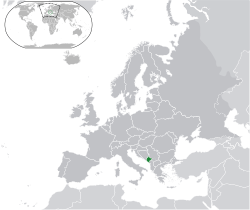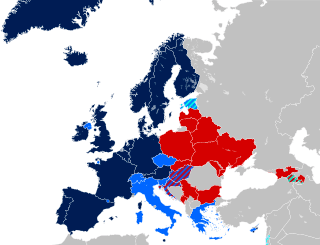LGBT rights in Montenegro
| LGBT rights in Montenegro | |
|---|---|
 Location of Montenegro (green) in Europe (dark grey) – [Legend] | |
| Same-sex sexual intercourse legal status |
Legal since 1977; age of consent equalized in 1977 |
| Gender identity/expression | Transgender people allowed to change gender |
| Military service | Gays, lesbians and bisexuals allowed to serve |
| Discrimination protections | Sexual orientation and gender identity protections (see below) |
| Family rights | |
| Recognition of relationships | No recognition of same-sex relationships; same-sex marriage banned by the Constitution |
| Adoption | No |
Lesbian, gay, bisexual, and transgender (LGBT) persons in Montenegro may face legal challenges not experienced by non-LGBT residents. Both male and female same-sex sexual activity are legal in Montenegro, but households headed by same-sex couples are not eligible for the same legal protections available to opposite-sex married couples.
Discrimination on the basis of both sexual orientation and gender identity is banned in employment, the provision of goods and services, education and health services. Montenegro also possesses hate crime and hate speech laws which include sexual orientation and gender identity as grounds of non-discrimination. The International Lesbian, Gay, Bisexual, Trans and Intersex Association has ranked Montenegro 23rd out of 49 European countries in terms of LGBT rights legislation.[1] Despite this, Montenegrin society has yet to reach a high level of acceptance, and discrimination against LGBT people often goes unreported.[2]
Legality of same-sex sexual activity
Montenegro decriminalised same-sex sexual activity in 1977. The age of consent (14) was also equalised in 1977.[2]
Recognition of same-sex relationships

¹ May include recent laws or court decisions which have created legal recognition of same-sex relationships, but which have not entered into effect yet.
There is no legal recognition of same-sex couples. The Constitution of Montenegro bans same-sex marriage.[3]
On 13 November 2012, then Deputy Prime Minister Duško Marković stated that the Montenegrin Government would prepare a bill giving some form of legal recognition to same-sex couples.[4] As of 2018, the Human and Minority Rights Ministry has drafted a bill to legalise registered partnerships. Under the bill, same-sex couples would be able to register their relationship and receive some of the rights, benefits and responsibilities of marriage. This would not include adoption and fostering rights. The Serbian Orthodox Church and the Democratic Front have come out in opposition to the proposal, claiming it would "wreck" Christian values and family life in Montenegro.[5]
Discrimination protections
On 27 July 2010, the Montenegrin Parliament passed a non-discrimination law that includes sexual orientation and gender identity as prohibited grounds of discrimination. This was one of the requirements the country had to meet for European Union membership.[6]
In 2013, the Criminal Code was amended to prohibit hate speech on the basis of both sexual orientation and gender identity, and to provide penalty enhancements if a crime is committed based on the victim's LGBT status. These changes came into force on 3 June 2014.[1]
Additionally, gays, lesbians and bisexuals are not banned from military service.
Gender identity and expression
Transgender people in Montenegro are allowed to change legal gender, but require undergoing sex reassignment surgery, sterilization, divorce if married and receiving a medical diagnosis to do so.[1]
Social conditions
Gays and lesbians may face discrimination and harassment in Montenegro. Anti-gay attitudes are deeply ingrained in society and there is widespread opposition to LGBT rights.[2]
LGBT activism
The gay scene is very small. The first Gay Pride event in Montenegro was held on 24 July 2013 in the coastal town of Budva, organized by the NGO "LGBT Forum Progress", and it subsequnelty caused various reactions in public.[7] On 20 October 2013, a Pride event took place in the capital city of Podgorica, where violent anti-gay protesters were arrested by police.[8]
In September 2017, the fifth annual Podgorica Gay Pride parade took place without any recorded incident. It was organized by the NGO "Queer Montenegro", and was attended by about 200 people.[9]
Summary table
| Same-sex sexual activity legal | |
| Equal age of consent (14) | |
| Anti-discrimination laws in employment | |
| Anti-discrimination laws in the provision of goods and services | |
| Anti-discrimination laws in all other areas | |
| Hate crime laws include sexual orientation and gender identity | |
| Same-sex marriage | |
| Recognition of same-sex unions | |
| Stepchild adoption by same-sex couples | |
| Joint adoption by same-sex couples | |
| Lesbians, gays and bisexuals allowed to serve in the military | |
| Right to change legal gender | |
| Access to IVF for lesbians | |
| Conversion therapy banned | |
| Commercial surrogacy for gay male couples | |
| MSMs allowed to donate blood |
See also
References
- 1 2 3 Rainbow Europe: Montenegro
- 1 2 3 From the Ottoman Empire to Modern Gay Rights
- ↑ Constitution of Montenegro Archived 8 October 2012 at the Wayback Machine.
- ↑ Montenegro promises gay pride and some marriage rights
- ↑ Plan for Same-Sex Unions Rouses Fury in Montenegro
- ↑ Montenegro fulfils EU membership requirement and protects LGBT people from discrimination Archived 24 September 2010 at the Wayback Machine. 28 July 2010.
- ↑ "Budva: Građani ne odobravaju paradu ponosa u svom gradu". Pobjeda.me. 23 July 2013. Archived from the original on 1 August 2013. Retrieved 11 April 2014.
- ↑ "Montenegro's gay pride march sparks violence". Al Jazeera. 20 October 2013.
- ↑ Montenegrin Capital Set for Gay Pride Parade